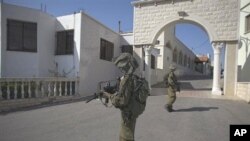Arab residents of a village on Israel's border with Lebanon are protesting an Israeli Cabinet decision for Israeli forces to withdraw from a part of the town they have occupied since 2006.
It is an occupation that was, in some ways, welcome.
Ghajar, a village of 2,000 people sits on the tense border between Israel and Lebanon, on land that Israeli forces recaptured in the 2006 Israel-Lebanon war.
Israel and Lebanon are still officially at war, and the unmarked, unofficial border runs down the middle of the village, in some cases through people's homes. Residents fear the village may be divided, and families separated.
On hearing news that the Israeli inner Cabinet had approved a withdrawal, the village's spokesman, Najib Khattib, protested on Israeli radio.
He accused the Israeli government of playing with the feelings of Ghajar's residents. He said the uncertainty of what will come is, in his words, killing the people, who he said are frustrated, bitter, and very disappointed.
Many village residents interviewed recently said they do not want to live under Lebanese rule, citing safety and economic reasons.
Israel was supposed to have withdrawn from the northern part of the village as part of a cease-fire agreement, but kept control of it as a security buffer. Across the border, southern Lebanon is a base for the Islamist group Hezbollah.
Israel says it will plan the details of the withdrawal in the next few weeks and will pull out in coordination with U.N. peacekeepers.
Israeli officials said they would ensure residents are able to move from one part of the village to another.
Arab Residents Protest Israeli Pullout from Village on Lebanon Border












